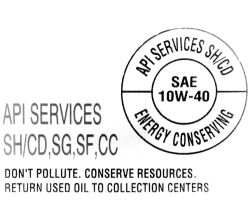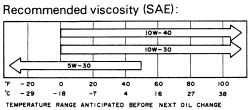
OIL
See Figures 1 and 2
The SAE (Society of Automotive Engineers) grade number indicates the viscosity of the engine oil; its resistance to flow at a given temperature. The lower the SAE grade number, the lighter the oil. For example, the mono-grade oils begin with SAE 5 weight, which is a thin, light oil, and continue in viscosity up to SAE 80 or 90 weight, which are heavy gear lubricants. These oils are also known as "straight weight'', meaning they are of a single viscosity, and do not vary with engine temperature.

 |  |
Fig. Fig. 1: Look for the API oil identification label when choosing your engine oil

 |  |
Fig. Fig. 2: Recommended oil viscosities
Multi-viscosity oils offer the important advantage of being adaptable to temperature extremes. These oils have designations such as 10W-40, 20W-50, etc. The "10W-40'' means that in winter (the "W'' in the designation) the oil acts like a thin 10 weight oil, allowing the engine to spin easily when cold and offering rapid lubrication. Once the engine has warmed up, however, the oil acts like a straight 40 weight, maintaining good lubrication and protection for the engine's internal components. A 20W-50 oil would therefore be slightly heavier than and not as ideal in cold weather as the 10W-40, but would offer better protection at higher rpm and temperatures because when warm it acts like a 50 weight oil. Whichever oil viscosity you choose when changing the oil, make sure you are anticipating the temperatures your engine will be operating in until the oil is changed again. Refer to the oil viscosity chart for oil recommendations according to temperature.
The API (American Petroleum Institute) designation indicates the classification of engine oil used under certain given operating conditions. Only oils designated for use "Service SG'' or greater should be used. Oils of the SG type perform a variety of functions inside the engine in addition to the basic function as a lubricant. Through a balanced system of metallic detergents and polymeric dispersants, the oil prevents the formation of high and low temperature deposits and also keeps sludge and particles of dirt in suspension. Acids, particularly sulfuric acid, as well as other by-products of combustion, are neutralized. Both the SAE grade number and the API designation bottle be found on the oil can. For recommended oil viscosities, refer to the chart.
SYNTHETIC OIL
There are many excellent synthetic and fuel-efficient oils currently available that can provide better gas mileage, longer service life, and in some cases better engine protection. These benefits do not come without a few hitches, however, the main one being the price of synthetic oils, which is three or four times the price per quart of conventional oil.
Synthetic oil is not for every car and every type of driving, so you should consider your engine's condition and your type of driving. Also, check your car's warranty conditions regarding the use of synthetic oils.
Both brand new engines and older, high mileage engines are the wrong candidates for synthetic oil. The synthetic oils are so slippery that they can prevent the proper break-in of new engines; most manufacturer's recommend that you wait until the engine is properly broken in - 5,000 miles (8,046km) - before using synthetic oil. Older engines with wear have a different problem with synthetics: they use (consume during operation) more oil as they age. Slippery synthetic oils get past these worn parts easily. If your engine is using conventional oil, it will use synthetics much faster. If your car is leaking oil past old seals you'll have a much greater leak problem with synthetics.
Consider your type of driving. If most of your accumulated mileage is high speed, highway type driving, the more expensive synthetic oils may be of benefit. Extended highway driving gives the engine a chance to warm up, accumulating less acids in the oil and putting less stress on the engine over the long run. Under these conditions, the oil change interval can be extended (as long as your oil filter can last the extended life of the oil) up to the advertised mileage claims of the synthetics. Cars with synthetic oils may show increased fuel economy in highway driving, due to less internal friction. However, many automotive experts agree that 50,000 miles (80,465km) is too long to keep any oil in your engine.
Cars used under harder circumstances, such as stop-and-go, city type driving, short trips, or extended idling, should be serviced more frequently. For the engines in these cars, the much greater cost of synthetic or fuel-efficient oils may not be worth the investment. Internal wear increases much quicker on these cars, causing greater oil consumption and leakage.
FUEL
All vehicles are designed to run on unleaded fuel. The use of leaded fuel in a car requiring unleaded fuel will plug the catalytic converter (NEVER USE LEADED FUEL IN AN UNLEADED FUEL VEHICLE), rendering it inoperative and will increase exhaust back-pressure to the point where engine output will be severely reduced. In all cases, the minimum octane rating of the fuel used must be at least Research Otcane No. 91 (octane rating 87) or higher. All unleaded fuels sold in the U.S. are required to meet this minimum octane rating.
The use of a fuel too low in octane (a measurement of anti-knock quality) will result in spark knock. Since many factors affect operating efficiency, such as altitude, terrain, air temperature and humidity, knocking may result even though the recommended fuel is being used. If persistent knocking occurs, it may be necessary to switch to a higher grade of fuel. Continuous or heavy knocking may result in engine damage.
Your engine's fuel requirement can change with time, mainly due to carbon buildup, which changes the compression ratio. If your engine pings, knocks or runs on, switch to a higher grade of fuel. Sometimes just changing brands will cure the problem.
OPERATION IN FOREIGN COUNTRIES
If you plan to drive your car outside the United States or Canada, there is a possibility that fuels will be too low in anti-knock quality and could produce engine damage. It is wise to consult with local authorities upon arrival in a foreign country to determine the best fuels available.